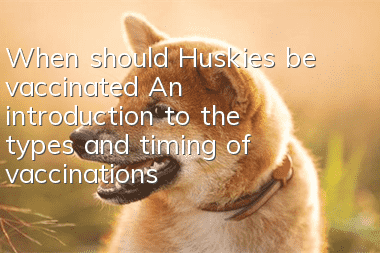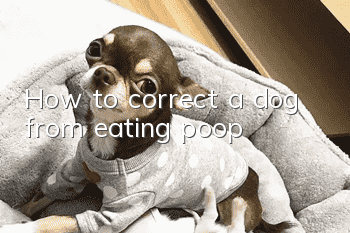When should Huskies be vaccinated? An introduction to the types and timing of vaccinations for Huskies

When should Huskies be vaccinated? Below, the editor will introduce to you the types and vaccination times of Husky vaccinations. Huskies must receive regular vaccinations, also known as vaccinations.
Especially Husky puppies between 4 months and 1 year old are extremely susceptible to diseases and have a very high mortality rate.
Therefore, you must vaccinate your Husky puppies regularly and don’t take any chances.
Next, I will introduce to you when Huskies should be vaccinated and what types of vaccines they should be vaccinated with.
1. What are the types of vaccinations for dogs: The types of vaccinations are mainly determined for the viral diseases that dogs are often susceptible to.
Currently commonly used attenuated rabies vaccine, canine distemper and rabies double attenuated vaccine, canine distemper, rabies and canine parvovirus triple attenuated vaccine, feline distemper and rabies double attenuated vaccine, canine distemper and rabies attenuated double vaccine, canine distemper, canine parvovirus triple attenuated vaccine Rabies, infectious hepatitis, parvovirus, parainfluenza), canine six or seven attenuated vaccines.
In some areas, corresponding inactivated vaccines for rabies, canine distemper, etc. are made for epidemic prevention.
2. Vaccination injection time for Husky dogs
45 days - two doses, 75 days - four doses, 105 days - six doses + rabies vaccine.
From now on, the six-link + rabies vaccine will be injected every other year. Before injecting the vaccine, special attention must be paid to whether the person is completely healthy, otherwise the injection should not be given.
3. Some precautions for giving Huskies vaccinations.
1. The vaccine used should be within the validity period. Inactivated vaccines should be shaken well before use and cannot be used after freezing; attenuated vaccines should be diluted with water and injected immediately, and cannot be left for a long time before use. Strictly follow the dosage instructions on the vaccine bottle label and do not take it for granted.
2. Dog vaccines are divided into domestic and imported. Usually people think that the more vaccines, the better. In fact, this is not the case. Vaccines are weak viruses that can be injected into dogs to produce resistance.
3. You must pay attention to hygiene. For example, it is best to cut and disinfect the hair before injection. It is not advisable to take a bath before and after vaccination, and it is not advisable to exercise strenuously after vaccination to prevent pinhole infection and reduce immune effect.
IV. A common question: Why do dogs get sick after being vaccinated?
Sometimes, dogs will get sick within a few days to ten days after being vaccinated. Don’t worry at this time and look for the cause first. Generally, it is mainly caused by the following two situations:
First, the dog is already sick when vaccinated, but it is in the incubation period and clinical symptoms have not yet appeared.
Second, the dog is infected with the virus before the vaccine takes effect (because the antibody reaches its peak only ten days after vaccination, and at this stage, the dog is in a state of no resistance). It is more reliable to inject hyperimmune serum (anti-canine distemper, parvovirus, etc.) before immunizing dogs that are prone to disease, especially young dogs, and then inject the vaccine 7-10 days later.
- Disadvantages of dogs eating too much salt
- What’s wrong with the swelling on both sides of the dog’s abdomen?
- Why do dogs poop in circles?
- What to do if your dog has diarrhea? Canine Heart Protection is your golden partner!
- What should pet stores pay attention to when pets are moulting in autumn and winter?
- Did you know these foods can be fatal to dogs?
- A few popular science tips about pet vaccinations!
- Do you know how to take the temperature of a sick husky?
- What does dog desensitization training mean?
- How to prevent skin diseases in Pug dogs



